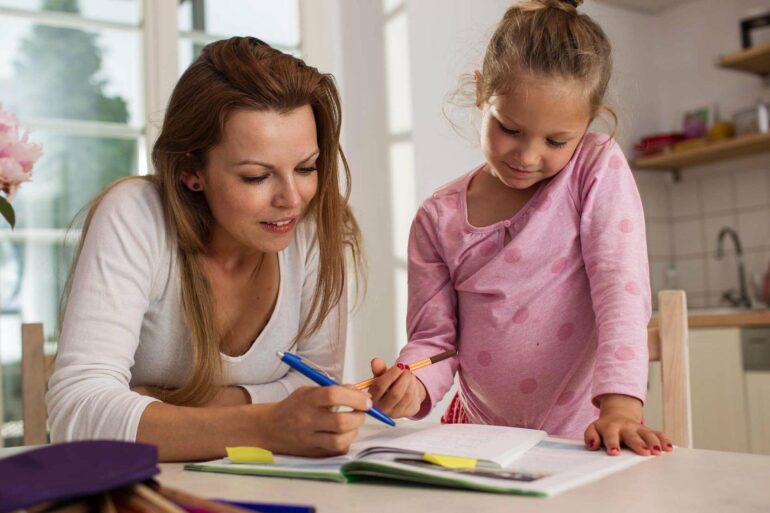Parental help with homework has no significant impact on children’s academic achievement in elementary school, according to Penn State College of Education researchers.
“There is no statistically significant association between parental help with homework in elementary school and children’s achievement, period,” said Katerina Bodovski, professor of education (educational theory and policy).
Bodovski is lead author of a new paper, “Parental Help With Homework in Elementary School: Much Ado About Nothing?” that was recently published in the Journal of Research in Childhood Education. The study, which draws on two nationally representative datasets, showed no statistically significant association between parental help with homework and student achievement. Further, the association between parental help with homework and achievement did not vary by parental level of education or child’s achievement level.
Bodovski’s co-authors on the paper are Ismael G. Muñoz, a recent doctoral graduate in the Department of Education Policy Studies (EPS); and Ruxandra Apostolescu, a doctoral candidate in EPS.
According to Bodovski, parental help with homework has long been hailed by educators and policy makers as an effective mechanism to help children succeed in school. In fact, the U.S. Department of Education promotes homework as an “opportunity for children to learn and for families to be involved in their children’s education.”
On the other hand, Bodovski said, a number of studies, including an article by University of Delaware Professor Laura Desimone, have demonstrated a negative impact of parental help with homework on children’s achievement. The negative relationship has been explained by the fact that parents tend to help struggling children and that their efforts were not enough to overcome the students’ deficiencies.
Bodovski and her colleagues took previous research to another level by using more sophisticated fixed effects statistical models. In their paper, the researchers state that their study makes two main contributions to the literature of parental involvement in children’s education.
Using more sophisticated statistical models taking into account variables such as socioeconomic status and parental education, the researchers found no effect of parental help with homework on elementary students’ math and reading achievement.
In their paper, the researchers suggest three possible mechanisms that may negate the potential benefits of parental help with homework: cognitive loss, adverse effects on home emotional climate and deferred responsibility.
Since one can’t assume that parents have a background in education and/or developmental psychology, or that they are even familiar with the American educational system (with about a quarter of children in the American schools having at least one immigrant parent), said Bodovski, they may not have the skills to properly guide their children in solving homework problems on their own. As a result, they may simply offer the correct answer, which negates the cognitive benefits of practicing problem-solving.
“If the purpose of homework is for the child to practice some skills or knowledge they learned in school, that is lost if the parent is doing the work,” she said.
In addition, Bodovski said, intensive daily involvement of parents with their children’s homework may increase stress in a family’s life. She cited literature by researchers such as Jessica McCrory Calarco, an associate professor of sociology at Indiana University, that suggested parents involved in their children’s homework may apply more pressure than what is needed, or may allow behaviors from their children that wouldn’t be tolerated in a classroom. It may also increase conflict between parents or between the parents and the child.
Finally, according to the researchers, parental help with homework “may contribute to a sense of deferred responsibility among children” and deprive them of the opportunity to acquire skills such as time management.
“The kids don’t get to experience struggling,” said Bodovski. “Elementary school is about the growth in the knowledge but even more so in child’s skills and habits.”
While the researchers’ study shows no evidence that parental help with homework is effective, Bodovski said, parents can help shape their children’s academic achievement by “setting the stage” for success. Other studies, she said, have shown that parental practices such as conveying high expectations and discussing school-related matters with their children can be beneficial for children’s learning.
Bodovski emphasized that the type of parental involvement that the study addresses is separate from parents helping their children while engaged in remote learning during the COVID-19 pandemic.
“COVID made potential parental involvement in school an imposed homeschool situation,” she said. “That is very different from parental help with homework when their child attends regular school.”
More information:
Katerina Bodovski et al, Parental Help With Homework in Elementary School: Much Ado About Nothing?, Journal of Research in Childhood Education (2022). DOI: 10.1080/02568543.2022.2027830
Provided by
Pennsylvania State University
Citation:
Study finds parental help with homework has no impact on student achievement (2022, August 8)
